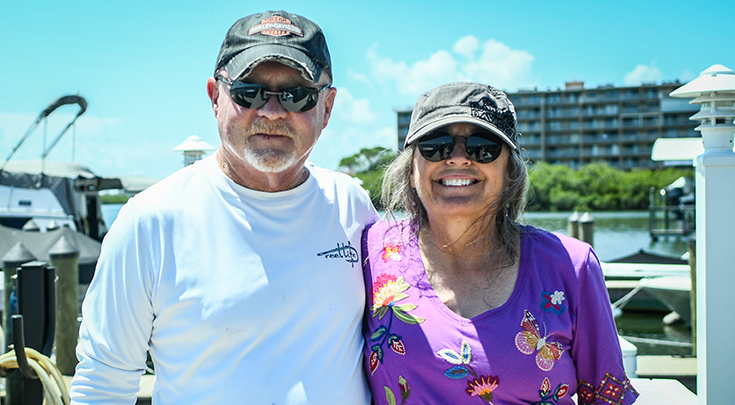In her 30s, Laureen Waterman experienced short periods of dizziness followed by some fatigue. Over the next 30 years, those short periods grew longer, more intense and more frequent.
Waterman saw numerous doctors and underwent extensive testing with no definitive answer to why she kept having, what turned out to be, epileptic seizures.
“I couldn’t drive. I couldn’t make any decisions on my own,” were a couple ways in which Waterman described her diminished quality of life. “I was so sick of having the seizures that I truly wanted to have something done.”
Waterman grew increasingly tired and frustrated with the many tests she needed that yielded no answers. One doctor she saw, before going to USF Health, dismissed her symptoms as a “hormonal imbalance” she said.
Looking for a definitive diagnosis and treatment solutions, she scheduled an appointment with Selim Benbadis, MD, professor and director of the Division of Epilepsy, EEG and Sleep Medicine in the Department of Neurology in the USF Health Morsani College of Medicine. This was when her life “changed forever,” as she described.

Laureen Waterman and Charles "Chuck" Waterman after their afternoon boat ride in Clearwater, Fla.
Dr. Benbadis remembers Waterman as a “very positive and very motivated” patient.
“She was ready to move forward. She was ready to be done having seizures,” Dr. Benbadis said. “She was certainly motivated to look for a solution, to try to localize where the seizures were coming from and explore every option possible.”
Dr. Benbadis and his team conducted extensive tests and imaging over the course of several months to identify what type and where Waterman’s seizures were coming from. The team concluded she was experiencing focal seizures from her temporal lobe, which Dr. Benbadis described as a “very favorable situation” as it pertained to her treatment options.
Seizures, in general, can be treated with medication and different types of therapies to minimize the frequency and intensity. Most patients who suffer from seizures can’t have surgery to eliminate them. However, there are a few cases when seizures can be treated with surgery, Dr. Benbadis explained. Waterman’s focal seizures provided Dr. Benbadis’ team the option to perform focal resective surgery on the part of her temporal lobe that was causing seizures.
Waterman said “Dr. Benbadis never told me what to do. He said these are your options,” as she recalled the appointment where she decided to take the surgery option. She said the trust and confidence she had in him and his team grew with every appointment and interaction she had.
Waterman underwent focal resective surgery on her temporal lobe in 2020 and has been seizure-free since. She is enjoying her life without fear of suffering another seizure. She and her husband Chuck now enjoy the things they love most like driving their boat in the waterways of Pinellas County. She is ready to help others who suffer from seizures and those who are contemplating brain surgery to eliminate seizures.
“I praise that epilepsy team, or I wouldn’t be where I am today,” Waterman said. “No one else diagnosed me. No one else ever took care of me the way he did.”